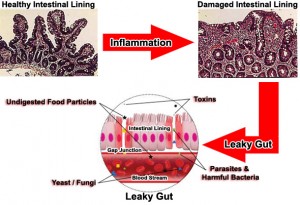In Naturopathic Medicine, Leaky Gut Syndrome (LGS) is considered to be a major leading cause in many chronic illnesses commonly seen today. In healthy guts, the intestinal lining remains intact. However, leaky gut syndrome is the result of the damages to the integrity of the intestinal lining leading to an increased intestinal permeability. As a consequence, toxins, pathogenic bacteria and incomplete digested proteins and fats may ‘leak’ out of the intestines to the bloodstream. This ‘leak’ triggers the immune system resulting in inflammatory response in the body
Factors affecting the permeability of the intestinal lining
- Overuse of antibiotics
- NSAIDS (non-steroidal anti-inflammatory drugs)
- Prescription corticosteroids
- Overconsumption of caffeine and alcohol
- Mold and fungal mycotoxins from fruits and stored grains
- Chemicals in processed foods
- Foods contaminated with heavy metals
Health Conditions linked with LGS
- Food allergy
- Rheumatoid arthritis
- Crohn’s disease
- Eczema
- Psoriasis
- Liver dysfunction
- Irritable bowel syndrome
- Candidiasis
- Autism Spectrum Disorder
- Skin allergy
Health begins in the colon. Regardless of any health condition, we always assess the guts first to detect any imbalance or tendency of Leaky Gut Syndrome using the EAV assessment device. For optimal healing of LGS, we use bioresonance balance coupled with gut healing diet and nutraceuticals to repair the damages of the intestinal lining.



